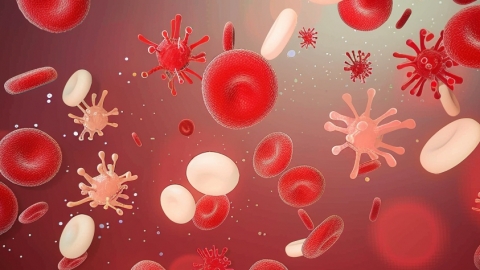Why is my baby's white blood cell count low when checking the blood due to fever, and what should I do?
Generally speaking, fever refers to elevated body temperature. When a baby has a fever accompanied by low white blood cell count, it may be related to factors such as incomplete development, medication effects, viral infections, nutritional anemia, or aplastic anemia. It is recommended to promptly adopt general treatments, medication therapy, and other methods for relief. If symptoms persist or discomfort occurs, timely medical attention is necessary. Detailed explanations are as follows:

1. Incomplete Development
Prior to full physical development, babies may experience mild fever and a corresponding decrease in white blood cell count due to external influences. Generally, symptoms will gradually improve with age and typically do not require special treatment.
2. Medication Effects
If the baby has previously taken medications such as antipyretic analgesics, antibiotics, or corticosteroids, these may also cause the aforementioned discomfort. If the symptoms are confirmed to be related to medication, the method of administration should be adjusted promptly under a doctor's guidance, and if necessary, the medication should be discontinued timely.
3. Viral Infection
If the baby recently contracted a viral infection, such as influenza virus or respiratory syncytial virus, it may affect bone marrow hematopoietic function, leading to reduced white blood cell production and even persistent fever. Symptoms such as coughing and phlegm production may also appear. Prompt medical treatment with medications such as oseltamivir phosphate granules, ribavirin aerosol, and ibuprofen suspension should be administered according to a doctor's instructions.
4. Nutritional Anemia
Nutritional anemia is usually associated with long-term improper diet. If left untreated and nutritional deficiencies become severe, it may affect bone marrow hematopoiesis, causing a decrease in white blood cells and body fever. Symptoms such as pale complexion and fatigue may also occur. Treatment may include medications such as ferrous sulfate syrup for children, calcium folinate for injection, and vitamin B12 injections, under a doctor's guidance.
5. Aplastic Anemia
Aplastic anemia is commonly associated with impaired bone marrow hematopoietic function. As the condition progresses, it can lead to reductions in both white blood cells and red blood cells, potentially causing fever, along with symptoms such as nosebleeds and skin bleeding. Prompt treatment under medical guidance using medications such as cyclosporine oral solution, methotrexate for injection, and deferasirox granules is necessary.
In addition, in daily life, parents should ensure the baby maintains a balanced diet. It is also important to keep indoor air well-ventilated to reduce the risk of infection.




